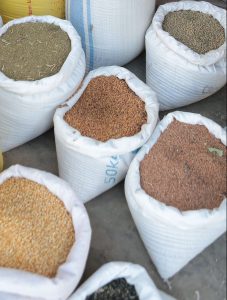ESSP Working Paper 126, by Paul Dorosh, Jenny Smart, Bart Minten, and David Stifel.
Abstract: Increases in cereal prices can have adverse effects on poor net food buyers. This is a particular problem in Ethiopia because of frequent natural calamities – especially droughts – that lead to significant price hikes. Conversely, falling domestic prices of some cereals (especially maize), typically at harvest time, can be detrimental to producers who are net sellers. Price stabilization efforts are therefore an important consideration for Ethiopian policy makers. This paper sheds light on options for cereal price stabilization in Ethiopia drawing on experiences of other developing countries. The international experience in food price stabilization shows that while some countries have achieved success, the efforts of many others have actually destabilized market prices at great fiscal cost. We assess the extent to which price stabilization efforts in Ethiopia were effective during the major El Niño induced drought of 2015/16 and find that opportunities were missed to enhance food security and consumer welfare through permitting private sector imports in order to curtail the rise in cereal prices and to reduce fiscal costs for the government and donors. Download the PDF.
